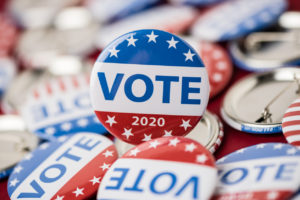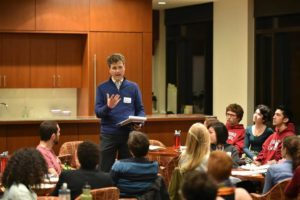New Indictment of Trump in Georgia: Stanford’s David Sklansky Explains DA’s Charges and Use of RICO Act
Late on Monday, August 14, a grand jury in Fulton County, Georgia, returned an indictment against former President Donald Trump and 18 co-defendants, charging them with racketeering in an effort to overturn the former president’s loss to Joe Biden in the 2020 presidential election. This is Trump’s fourth criminal indictment in a matter of months. Here, Professor David Sklansky, a criminal law expert and former prosecutor, discusses the charges.

The District Attorney for Fulton County, Fani Willis, charged Trump and his co-defendants under the state’s RICO Act. First, can you explain what the RICO Act is?
RICO stands for “Racketeer Influenced and Corrupt Organization.” Like the federal statute on which it is modeled, Georgia’s RICO law criminalizes participation in a pattern of racketeering activity—which basically means two or more violations of certain other state criminal laws—carried on through an organization or network. In this case, the Georgia prosecutors have charged 19 defendants, including Trump, with working as an informal network and committing a range of state crimes to overturn the 2020 election.
Why would the DA choose to charge under RICO?
Like the federal law, Georgia’s RICO statute allows prosecutors to charge a wide range of offenses and defendants in a single indictment, and then typically to hold a single trial as well. The defendants don’t all have to be working hand in hand, or even necessarily to be aware of each other. Monday’s indictment, for example, includes defendants ranging from Trump, some of his lawyers, and members of his administration, to Republican officials in Georgia who were among the so-called fake electors that Trump and his supporters tried to use to throw Biden’s election.

How serious are the charges? Do any standout as more so?
The indictment contains 41 counts, and they are all felonies. In addition to the RICO charge, they include allegations of election fraud, false statements to the Georgia legislature, soliciting state officials to violate their oaths, forgery, impersonating public officers, witness tampering, and illegally accessing computer records. What stands out more than any particular charge is the accumulation, the panoramic sweep of this indictment.
Having said that, there are things worth noting about some of the specific charges in the indictment, beyond the RICO count that allows the prosecutors to bring all the charges in a single indictment. The charges of forgery and impersonating public officers have to do with the so-called fake electors scheme, and the state statutes underlying these counts of the indictment are much narrower and more tightly focused than the ones that the special counsel, Jack Smith, employed to get at the same conduct in the federal criminal case now proceeding against Trump in Washington, D.C. In some ways they are more obvious fits for the fake electors scheme. The same can be said for the charge of soliciting state officials to violate their oaths. The Georgia prosecutors have charged Trump with this crime in connection with his January 2, 2021, telephone call to Georgia’s Secretary of State Brad Raffensperger—the call in which Trump urged Raffensperger to “find 11,780 votes,” which he needed in order to swing the state from Biden to Trump.
I think the charges of witness tampering in Monday’s indictment are also worth noting. They have to do with the harassment, public smearing, and attempted intimidation of an election worker, Ruby Freeman, who Trump and his supporters falsely and repeatedly claimed—often in racially loaded ways—had engaged in election fraud. Most of the crimes with which Trump has been charged, not just in Georgia but also in New York, Florida, and Washington, D.C., have large, intangible victims—like the United States as a whole. The charges in the Georgia indictment regarding the hounding and smearing of Ruby Freeman put a human face on what can otherwise seem like abstract violations.
How strong a case does the DA have? I understand that the jury didn’t take too long to charge.
The indictment isn’t evidence; it’s just a set of charges. This case was actually presented to two grand juries in Georgia. The first was an advisory grand jury, which apparently recommended that charges be filed. The second was the grand jury that assessed whether there was probable cause to return the indictment, and decided that there was. Grand juries can be an important check on prosecutors, but proceedings in front of grand juries are not adversarial. There are no defense attorneys in the room. The prosecutors run the show. So, the fact that a grand jury returned charges here, however long they considered the case, doesn’t change the fact that the defendants still have the presumption of innocence, which Willis herself emphasized Monday night.
How do you expect Trump’s legal team to defend him? What’s their strongest argument?
I think their principal strategy here, as in the other three criminal cases now pending against Trump, will be delay. You sometimes hear defendants say, “I look forward to vindicating myself at trial.” That’s not something you ever hear from Trump. Aside from delay, the other strategy that Trump and his lawyers will employ is trying to change the subject—to talk about the district attorney, or the judge, or anything other than Trump’s own conduct.
When and if the case goes to trial, and Trump’s lawyers are constrained by the judge to focus on legally relevant issues, they are likely to argue that Trump lacked criminal intent. They will say that he honestly believed all the things he said, so he wasn’t acting corruptly or fraudulently, and he wasn’t trying to get state officials to violate their oaths. On the contrary, Trump’s lawyers will say: The former president was trying to get Georgia officials to comply with their oaths. So, in this case, as in the case that Jack Smith has brought in Washington, D.C., proving Trump’s state of mind will be critical to the prosecution’s case.
Listen to David Sklansky discuss RICO Laws and the Donald Trump Indictment on Vox podcast The Weeds
Are all 19 of the defendants in this case facing equally serious charges?
They are all charged in count one of the indictments, the racketeering charge, which is the core of the case. But the specific acts of racketeering—the so-called predicate crimes—charged in the indictment vary from defendant to defendant. All of the defendants face serious charges, but Trump is clearly at the center of the racketeering scheme.
I understand that Willis does plan to try all 19 together. Is that significant?
It complicates the case in all kinds of ways. But it has advantages from the prosecutor’s standpoint. A joint trial makes it harder for defendants to use what’s called the “empty chair defense,” blaming someone else, who isn’t in the courtroom, for the crimes they’ve been charged with committing. Here, they’ll be pointing fingers at each other.
It’s worth noting that Willis has experience with RICO cases and large, joint trials. Several years ago she successfully prosecuted more than 30 Atlanta educators in a RICO case involving a scheme to cheat on standardized tests. Most of the defendants wound up entering into plea deals—something that could happen in this case, as well. But 12 of the defendants went to trial in a single proceeding and 11 were convicted.
These are state charges. Does that matter? Some have speculated that the federal charges are vulnerable to stalling and political influence, depending on who wins the 2024 election.
It does matter that these are state charges, and not just because state prosecutors don’t take orders from the president or the federal Department of Justice. It also means that any convictions in this case can’t be set aside by a presidential pardon.
What happens next? How soon will this case go to trial?
Willis said Monday night that her office will be requesting a trial date within the next six months. That seems ambitious, given the complexity of the case and the number of defendants. The RICO case against the Atlanta educators took a year and half to get to trial after it was indicted, and then the trial itself stretched out over six months.
This is the fourth indictment of Trump. Can you talk about the complexities of mounting four jury trials, each in a different state, while he’s campaigning for the presidency? Do any of the four indictments, if he’s convicted, prevent him from holding public office?
The scheduling problems will obviously be significant. There will need to be some decisions made about how the various cases will be sequenced. Willis said last night that it is not particularly important to her whether her case goes to trial first or last, and given its complexities it is not likely to be tried first.
As a constitutional matter, a criminal conviction, state or federal, wouldn’t bar Trump from becoming president again, although it could conceivably influence a decision about whether he is covered by the provision of the Fourteenth Amendment that bars anyone who has engaged in “insurrection or rebellion” against the United States from holding office.
David Alan Sklansky is the Stanley Morrison Professor of Law and Faculty Co-Director of the Stanford Criminal Justice Center. His most recent book is “A Pattern of Violence: How the Law Classifies Crimes and What It Means for Justice” (Harvard University Press, 2021).
